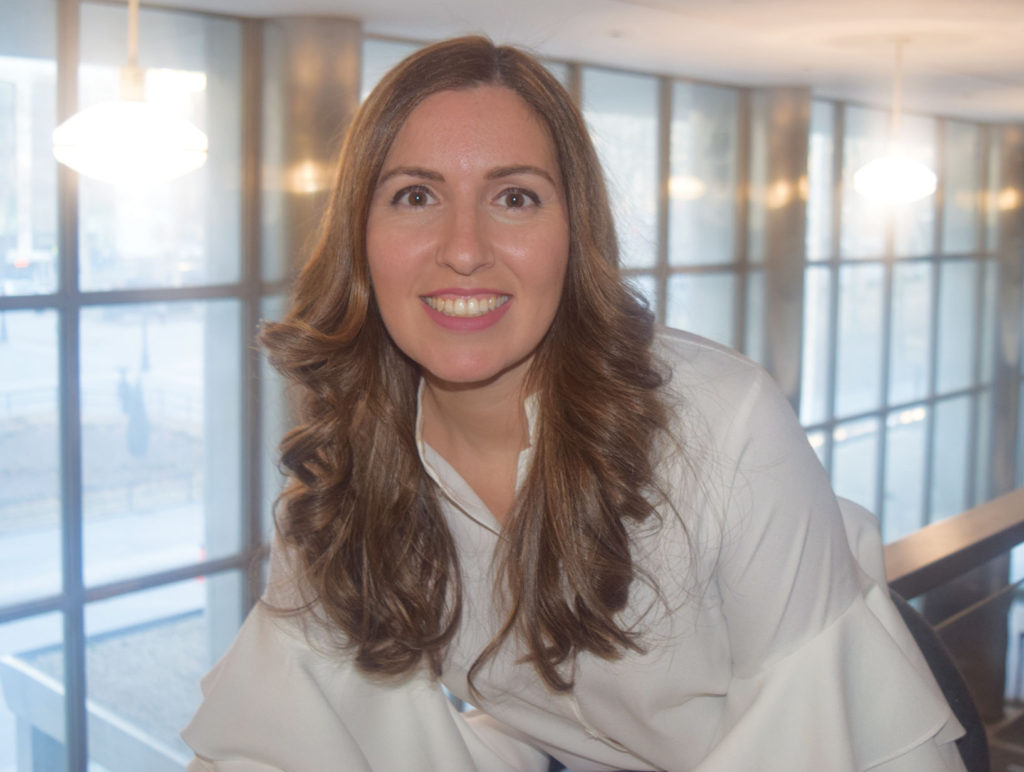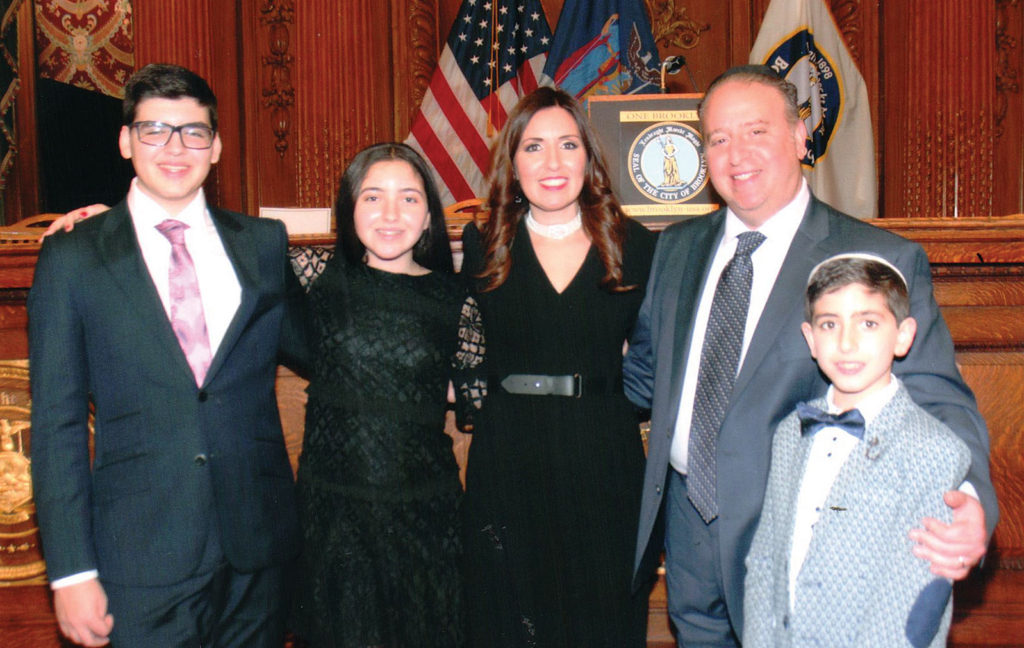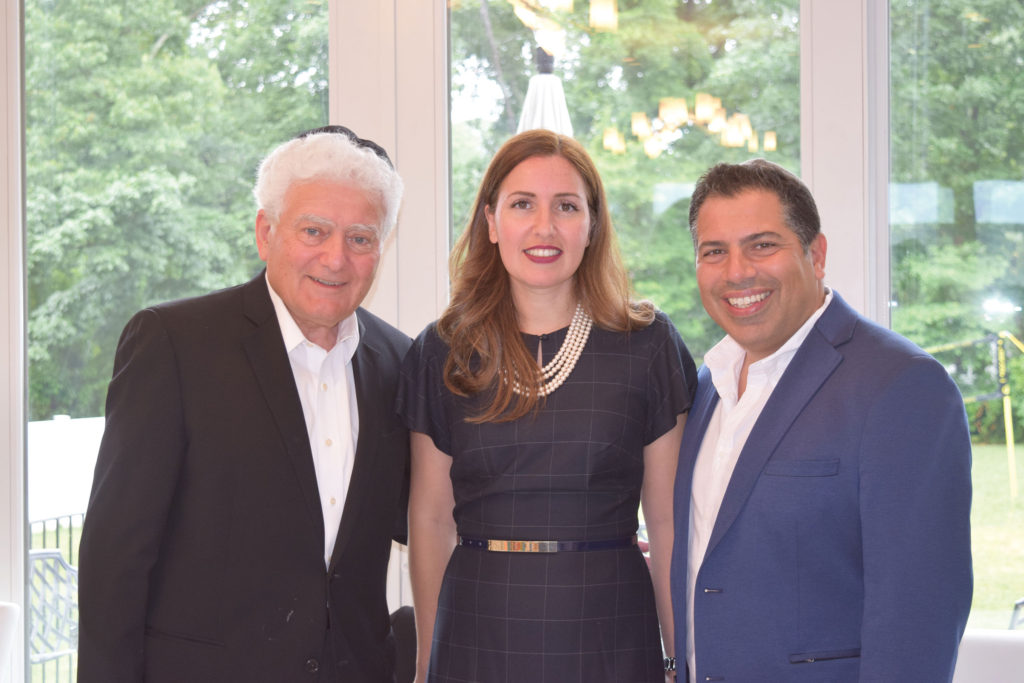
CIVIL COURT JUDGE & NYS SUPREME COURT NOMINEE
SARI J. SETTON
ORTHODOX SEPHARDIC FEMALE MAKES HISTORY!
JUDGES MUST POSSESS EXCELLENT LOGICAL REASONING, ANALYTICAL, AND DECISION MAKING SKILLS. THEY MUST BE ABLE TO ANALYZE COMPLEX CASE AND STATUTORY LAW, AND RENDER FAIR AND SOUND LEGAL DECISIONS. THEY MUST BE ETHICAL AND COMPETENT, AND ACT WITH INTEGRITY AND INDEPENDENCE.
They must be impervious to corruption and endure immense pressure. Judges enter their careers knowing that they will initially earn far less than if they had gone into private law practice, or worked with a large firm. They often feel a greater calling, wanting to serve their communities and help shape the law.
Gina Levy Abadi was elected to Kings County Civil Court in 2018. She is up for election this November to The New York State Supreme Court. Not only does she embody the characteristics mentioned above, but she is a fantastic daughter, sister, wife, mother, friend, and mentor. Rounding it all out, she is grounded and humble—a truly inspiring woman.
Sari J. Setton (SS): State Supreme Court Justice nomination! So well deserved, any opening remarks?
Gina Levy Abadi (GLA): Yes, I do want to first thank all the individuals within government who helped secure my nomination. Kings County Democratic Chair Assemblywoman Rodneyse Bichotte Hermelyn, Councilman Mark Treyger, and District Leader David Schwartz secured wide reaching party support. Major community organizations such as the SCF, and Jewish leaders throughout Brooklyn advocated for, and supported, my advancement.
SS: What was your personal journey like?
GLA: I attended Magen David Yeshivah for high school, where—believe it or not, I wasn’t a great student. I had maybe a “B” average. I then attended Brooklyn College where I majored in philosophy. I have to say that coming from yeshivah, college was a very easy experience. I graduated college with high honors. After I graduated, I met the man who would later become my husband, Joey Abadi. I applied to Brooklyn Law School and received a merit based scholarship. I entered law school in the summer of 1998, and was married in the summer of 1999. I sat for the Bar Exam in July of 2001, and started work the next day, clerking for a judge.
SS: Why work for a judge and not a law firm, where you could have made more money?
GLA: I succeeded in law school. When it came time to interview for jobs, I wanted a 9 to 5 schedule so I could still be home for my family. I decided on a government job because it afforded me all of that. I clerked for my judge for 18 years. Through working as a clerk, I watched my judge render decisions and felt confident that I could serve in that capacity. I knew I was in the right place when I was needed at home during a work day and my judge—my boss—said to me “family comes first.”
SS: What can you tell me about your work-home balance dynamic?
GLA: For the first ten years of my marriage, I lived next door to my parents. It was harder when my children were little. B”H the community instills a strong family support system on which we can hopefully lean. It’s that support that enabled me to achieve success. My mother sometimes cooked and helped in caring for my children. My mother is such a fantastic cook. Everyone wanted to be in my law school study groups because she fed us! My father taught my sons Hebrew and the weekly parashah. My sister also provided immeasurable support. I feel blessed in so many ways.
SS: What is an example of how you apply your career in helping to raise your children?
GLA: I feel like I am very fortunate in that regard. I have brought my children to court where they watch me rule on drunk driver cases, drug cases, and other cases where people made very poor choices. I then spoke candidly to them about the perils of life and how to avoid them. Because my children have seen women as well as men, in positions of power, I believe that it has shaped them and instilled in them a positive way.
SS: Are you elected or appointed?
GLA: I am elected, which means I must raise money and spend my own money to run a campaign, much like elected politicians. My term as a Civil Court Judge is for 10 years. This November I hope to be elected to the New York State Supreme Court where my term will be for 14 years.
SS: You won your election in 2018 by a large margin. What were some of your take-aways from that election and the process itself?
GLA: Community involvement is extremely important. Having run a campaign and seeing first-hand how many people actually vote, I was surprised at the number of registered voters vs how many people actually vote. We as a community need to have our voices heard by going to the polls.

SS: If elected, how do you plan to use your position aside from adjudicating cases?
GLA: For 20 years I have been coaching (as a volunteer) the Magen David Yeshivah Mock Trial Team. I do it to educate and inspire youth—to show them what is possible. Many of my students have gone to law school and graduated under my mentorship. Outside of that, I will continue educating the public on laws and accepting speaking engagements when invited.
SS: You mentor the students of Magen David Yeshivah. What is your mentoring style?
GLA: I encourage my students to come to court and see what a lawyer does, see what I do, and watch court proceedings. I answer questions, and I’ve also had fellow judges speak to them and answer questions too.
SS: What key challenge do you face regularly in your line of work?
GLA: Judges are human. We must often listen to irrational arguments, while trying to maintain a calm and even demeanor—listening impartially even when nature would force otherwise.
SS: Judges are regular people who live in our neighborhoods. Crime affects us all. How do judges understand the ripple effects of both the crimes committed and the punishments served on the criminals?
GLA: Judges who sit in criminal court are required to tour the jails—and it happens periodically. It is necessary for judges to understand where they are sending a defendant if they cannot post bail. I remember a difficult decision I had to make once. I let a young woman out on bail. The newspapers wrote criticizing me, criticizing that decision—but the decision was based on whether she was going to return to court for her hearing, not whether she had committed the crime. Bail law doesn’t always allow you to put someone away. Judges are not permitted to have a view publicly. We take an oath and follow the law, we don’t always have to agree with it, we must uphold it.

SS: You are a Democratic candidate. You believe strongly in family values, the values of our community. We are in a heated political climate all around the country, over so many issues. What would you say to both Democrats and Republicans?
GLA: There are good people on both sides of the political aisle. You may not agree with everything, but I believe in bringing people together, working on solutions to create a better society. When people choose to work together on issues of quality of life and crime prevention, great things can be achieved.

SS: What message would you want to impart to the girls, young women, and women of our community?
GLA: You can have everything. You can balance work and career. Don’t be afraid to ask for help along the way, you would be surprised how many people, both friends and family, are there to support you. Have positive mentors and surround yourself with people who are encouraging.
Judge Gina Levy Abadi is running for New York State Supreme Court Judge on all party lines this November, which means she is listed on the Democrat, Republican, and Conservative lines on the ballot. When elected, she will continue to work hard to execute the duties of her position with integrity. She realizes the uniqueness of her position, and the responsibilities that it carries, and will continue to mentor and inspire the young adults of the community.
The SCF encourages all registered voters to vote in the Tuesday, November 2nd general election in NYC.
Sari J. Setton is the SCF’s executive director.



